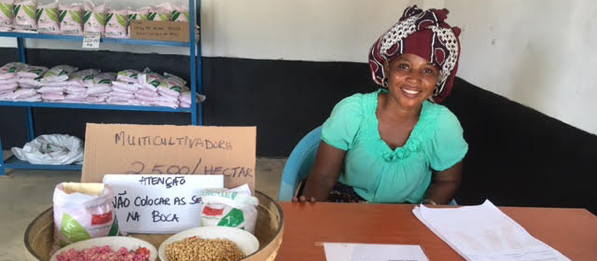This is the second post of Farming First’s #FillTheGap campaign to highlight the gender gap facing rural women working in agriculture.
For Mozambican women who dream of building a business from the fields up, they are often thwarted at the first furrow: women account for just a quarter of official land owners.
Josefina dos Santos Lourenço had aspirations of owning her own business but she wasn’t even earning enough selling food at her small market stand to support her family. Though she believed in herself, she couldn’t find a way to put her talents to use increasing her income.
That all changed when she saw an advertisement posted by Export Marketing Company Limited (EMCL), a major agricultural trading company that was recruiting entrepreneurs to run its new input supply shops in Mozambique.
With support from Fintrac’s Feed the Future Partnering for Innovation program, EMCL is building “farmer empowerment hubs” in previously underserved areas of Mozambique. These hubs consist of warehouse storage, input shops, and equipment rental shops, providing farmers with essential access to agricultural products and services.
By recruiting and training promising female entrepreneurs like Josefina to manage the input shops, EMCL offers employment opportunities in rural areas while increasing their company’s commodity buying business, as farmers’ access to improved inputs and mechanization services leads to increased productivity.
For Josefina, the moment she learned she had been selected to manage EMCL’s shop in Mecuburi, north-eastern Mozambique, was “one of the best moments of my life.” Once she had been selected, EMCL trained her in business practices such as bookkeeping and marketing, providing Josefina with three trainings in the first six months of her running the shop.
It also supplied her business with the initial inventory at a 50 per cent discount to get the business started. EMCL helps entrepreneurs with initial marketing activities in the community through pamphlets and its ICT platform, which provides important crop and weather information to farmers.
Josefina’s shop now serves nearly 1,000 farmers in her community, providing them with access to inputs and equipment rental that were previously unavailable in their area. Using the input supply shop as a starting point, she has expanded her business to include other items needed in the community, such as groceries, cosmetics, and mobile phone airtime that provide her shop with an additional income stream that also helps offset lower agricultural purchases in the offseason.
“I always dreamed of owning a shop but my financial limitations prevented me from doing so,” she said.
Through EMCL’s entrepreneur recruitment program, Josefina and 30 entrepreneurs like her are able to take advantage of an opportunity to empower themselves and increase their incomes while bringing essential products and services to smallholder farmers.
“I have no words to explain my joy,” Josefina says. “Today, I’m not only financially independent, but also my family is receiving lots of respect in my area. I am the queen of Mecuburi now!”
For more stories of bridging the gender gap, visit Farming First’s Fill The Gap page or follow #FillTheGap on social media.



